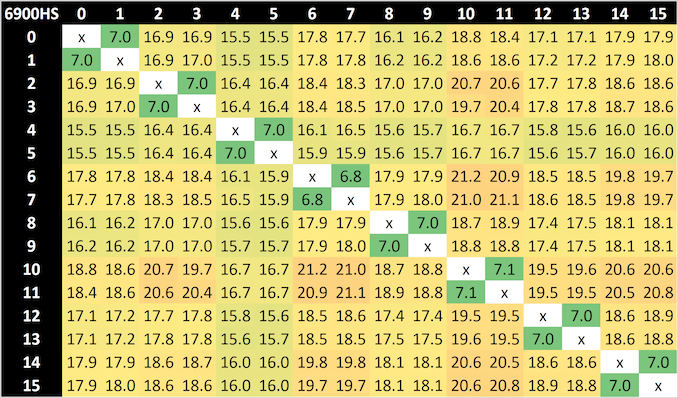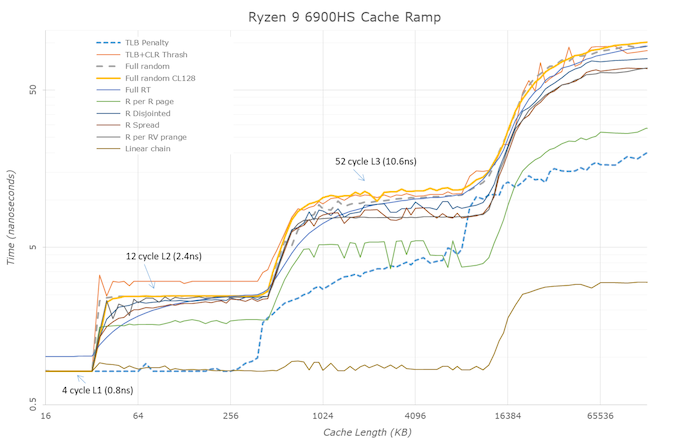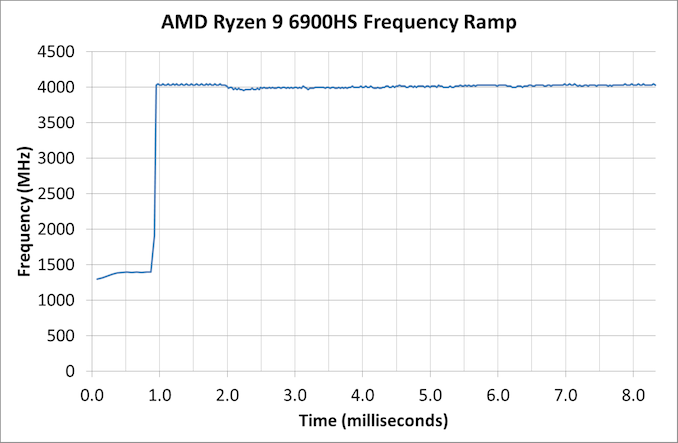AMD's Ryzen 9 6900HS Rembrandt Benchmarked: Zen3+ Power and Performance Scaling
by Dr. Ian Cutress on March 1, 2022 9:30 AM ESTCore-to-Core, Cache Latency, Ramp
For some of our standard tests, we look at how the CPU performs in a series of synthetic workloads to example any microarchitectural changes or differences. This includes our core-to-core latency test, a cache latency sweep across the memory space, and a ramp test to see how quick a system runs from idle to load.
Core-to-Core
Inside the chip are eight cores connected through a bi-directional ring, each direction capable of transmitting 32 bytes per cycle. In this test we test how long it takes to probe an L3 cache line from a different core on the chip and return the result.
For two threads on the same core, we’re seeing a 7 nanosecond difference, whereas for two separate cores we’re seeing a latency from 15.5 nanoseconds up to 21.2 nanoseconds, which is a wide gap. Finding out exactly how much each jump takes is a bit tricky, as the overall time is reliant on the frequency of the core, of the cache, and of the fabric over the time of the test. It also doesn’t tell us if there is anything else on the ring aside from the cores, as there is also going to be some form of external connectivity to other elements of the SoC.
However, compared to the Zen3 numbers we saw on the Ryzen 9 5980HS, they are practically the same.
Cache Latency Ramp
This test showcases the access latency at all the points in the cache hierarchy for a single core. We start at 2 KiB, and probe the latency all the way through to 256 MB, which for most CPUs sits inside the DRAM.
Part of this test helps us understand the range of latencies for accessing a given level of cache, but also the transition between the cache levels gives insight into how different parts of the cache microarchitecture work, such as TLBs. As CPU microarchitects look at interesting and novel ways to design caches upon caches inside caches, this basic test proves to be very valuable.
The data here again mirrors exactly what we saw with the previous generation on Zen3.
Frequency Ramp
Both AMD and Intel over the past few years have introduced features to their processors that speed up the time from when a CPU moves from idle into a high-powered state. The effect of this means that users can get peak performance quicker, but the biggest knock-on effect for this is with battery life in mobile devices, especially if a system can turbo up quick and turbo down quick, ensuring that it stays in the lowest and most efficient power state for as long as possible.
Intel’s technology is called SpeedShift, although SpeedShift was not enabled until Skylake.
One of the issues though with this technology is that sometimes the adjustments in frequency can be so fast, software cannot detect them. If the frequency is changing on the order of microseconds, but your software is only probing frequency in milliseconds (or seconds), then quick changes will be missed. Not only that, as an observer probing the frequency, you could be affecting the actual turbo performance. When the CPU is changing frequency, it essentially has to pause all compute while it aligns the frequency rate of the whole core.
We wrote an extensive review analysis piece on this, called ‘Reaching for Turbo: Aligning Perception with AMD’s Frequency Metrics’, due to an issue where users were not observing the peak turbo speeds for AMD’s processors.
We got around the issue by making the frequency probing the workload causing the turbo. The software is able to detect frequency adjustments on a microsecond scale, so we can see how well a system can get to those boost frequencies. Our Frequency Ramp tool has already been in use in a number of reviews.
A ramp time of within one millisecond is as expected for modern AMD platforms, although we didn’t see the high 4.9 GHz that AMD has listed this processor as being able to obtain. We saw it hit that frequency in a number of tests, but not this one. AMD’s previous generation took a couple of milliseconds to hit around the 4.0 GHz mark, but then another 16 milliseconds to go full speed. We didn’t see it in this test, perhaps due to some of the new measurements AMD is doing on core workload and power. We will have to try this on a different AMD Ryzen 6000 Mobile system to see if we get the same result.













92 Comments
View All Comments
mode_13h - Friday, March 18, 2022 - link
> I haven't seen most of the anime you mentionedThe Patlabor OAVs and movies are good for an 80's/90's nostalgia hit, IMO. It's that sort of old timey mecha anime that attracted many of us to the anime multiverse, in the first place. When I watched the OAVs on blu ray, the restoration was fantastic. Very crisp HD.
> the new Dune was a big disappointment to me.
Yeah, I read the trilogy before watching it. I'm so glad I did, because I knew exactly what was going on. Otherwise, I might've been lost.
Yeah, they tried too hard to follow the narrative of the book. I think the only way to do it, and still end up with a good movie, is to focus on a particular story arc. If they'd nailed it, that would've set the stage for more to follow.
I'd imagine they shot so much footage that it could conceivably be re-edited. I know they didn't shoot beyond the movie's ending, because I saw an interview with Zendaya, where she said she was only on location for the desert scenes for a couple days.
mode_13h - Friday, March 18, 2022 - link
I mean the original Patlabor OAVs. There are about 7 of them, I think. Near movie-quality animation, for the time.BTW, some aspects of the Ghost in the Shell franchise definitely make more sense, as we move towards the future it predicted.
Oh, and Planetes is a nice series about a crew working to collect orbital debris. It aired about 2 decades ago, but I think it was based on manga that was older, still. Some aspects of it were a bit anachronistic even for the time, but other aspects about space physics and orbital living clearly received a lot of thought and attention. The story arc is a lot more interesting than it sounds, with lots of commentary about life, love, the privatization of space, corporate politics, geopolitics, personal ambition, and the ultimate path and personal costs of space exploration. If you don't mind a bit of slapstick and are willing to look past some of the more anachronistic aspects, it's worth a watch.
GeoffreyA - Saturday, March 19, 2022 - link
I haven't read the books but hope to do so before going into the coffin. Well, my view is that the excessive realism somehow harms the movie. If you go back to Lynch's 1984 version, despite the outlandish visuals, it is pretty alien, as Dune should be; and from a storytelling point of view, does that pretty well, going forward rapidly. Also, the princess's summary in the beginning got the viewer up to speed with this strange universe.The new movie took "show, don't tell" a bit too far, and the story didn't feel cohesive or unified, especially towards the end. It was tedious. The visions seemed forced and overdone. And for an epic, the cinematography was poor in my opinion. A key problem, I feel, is that it didn't bring out the true spirit of the desert. Coupled to this issue is Zimmer's music, in my view, missing the mark. It was too loud and vulgar, and seemed to view the desert from a commercialised, Hollywood lens, rather than feeling its power and reflecting that desolation. Then the CGI, I say no more.
On the plus side, two sequences were outstanding: when Paul first steps onto the desert and picks up the sand/spice; and Paul and his mother's flight through the dust storm. That was world class.
GeoffreyA - Saturday, March 19, 2022 - link
When I saw the Patlabor poster some time ago, I was intrigued. That was part two I believe. Yes, as time goes by, I prefer to look back at older anime. I think it's fair to say the industry has gone downhill these days.And thanks for that great description of Planetes. I won't mind giving one or two episodes a go and seeing what it's like. It reminds me that I've still got to watch Cowboy Bepop.
mode_13h - Sunday, March 20, 2022 - link
Planetes is one of those series that takes a while to get going. The further you go, the deeper it gets. If you really don't like the first couple episodes, maybe it's not for you. However, you do get rewarded the longer you stick with it.mode_13h - Monday, March 21, 2022 - link
> I haven't read the books but hope to do so before going into the coffin.There's a lot you can read into it about the corrupting tendencies of empires and exploitation of peoples and their natural resources. It feels like it might've tapped into the decolonization zeitgeist, or at least what I presume it should've been, as the former colonial powers of Europe unwound their foreign holdings. I could do without so much of the psychedelic stuff, but I know Heinlein also went there. So, maybe that was just another trend in 1960's sci fi.
> If you go back to Lynch's 1984 version
It's funny this came up, because I just started watching it last weekend and finished it mere hours ago. It did seem a bit overwrought. I remember how he seemed rather too fascinated with the perversions and excesses of the Harkkonen. I thought the exposition was a bit too much for the naive movie-goer, but probably a helpful reminder for those who'd read the books years earlier.
Since I came to it with low expectations, I really wasn't disappointed. Since the movie had many shots in low light, I wonder just how much I benefited from seeing a clean, HD presentation. Overall, I guess my main complaints would be that some of the acting seemed sub-par (Sting, for one, definitely should've stayed focused on the music business) and I just wouldn't have tried to cover so much plot. It felt busy and probably hard for people to follow, without having read it. I wasn't too bothered by the dated special effects, but they do kind of jump out at you. Some of the sets were quite impressive.
> The new movie took "show, don't tell" a bit too far
Probably a reaction to Lynch's version. I also wonder if his 1990 TV series, Twin Peaks, was also sort of a reaction to the criticism he got for too much exposition in Dune.
Anyway, the last I'll say about it is that I'm finding the Wikipedia page on Dune to be a good resource on the author and his influences.
GeoffreyA - Monday, March 21, 2022 - link
The visuals prevented me from watching it for a long time. It was only after I became a fan of David Lynch that I was able to see past that and appreciate what he had done. I think for a two-hour adaptation of such a vast novel, it is a commendable attempt, and I prefer it. As for the excesses, etc., well, that's Lynch as always. He always tends to bring out the darker side of things.I actually love Twin Peaks, and the recent season 3 was spectacular, if strange. But strange is this man's domain. Did too much exposition have an effect on his later work? I would say that Dune was an exception. Generally, his films are pretty obscure, nothing much being spelled out, and one often has to piece together a puzzle. He started off with that note in Eraserhead and hasn't really changed in four decades.
GeoffreyA - Monday, March 21, 2022 - link
"Sting, for one, definitely should've stayed focused on the music business"The best line!
mode_13h - Tuesday, March 22, 2022 - link
> I actually love Twin PeaksI never really watched it. My older sister watched the original TV airing. All I remember of it was the general strangeness and a recollection that even its conclusion left much unanswered.
I haven't seen much of Lynch's work, but I did enjoy Mulholland Dr. All I remember from it is that I decided it's a fool's errand to make complete sense of the plot, since there were paradoxes inserted seemingly with the intent to break any strict interpretation.
> Did too much exposition have an effect on his later work?
That's not really what I meant. I was suggesting he got too much negative feedback on all the exposition in Dune, and therefore went too far in the other direction of being too obscure.
From what I've heard, Kubrick would sometimes indulge in excessive obscurity to create a false sense of depth. The prime example being 2001: A Space Odyssey. If you actually read the book, you can supposedly see what kind of shenanigans he got up to, which I've heard he even admitted in an interview.
> He started off with that note in Eraserhead and hasn't really changed in four decades.
Ah, right. I never got round to watching that one.
GeoffreyA - Wednesday, March 23, 2022 - link
Mulholland Drive is perhaps my favourite film of all films. Again, it's the tragic note that speaks to me, and Naomi Watts, brilliant. I've racked my head over this story a great deal, and my tentative answer is that even the latter part, Diane's tale, is a dream, various pieces of evidence pointing there, particularly the blue box and the smoke. The question is, whose dream is *that*! Perhaps it's the director's dream after all.I haven't read 2001, but you're right, the film keeps things pretty bare and mysterious, and that creates the feeling of a deep, even terrible, mystery. Our age could actually learn something from that and stop filling in all the details. The human mind does a far better job at piecing together the monster in the shadows.